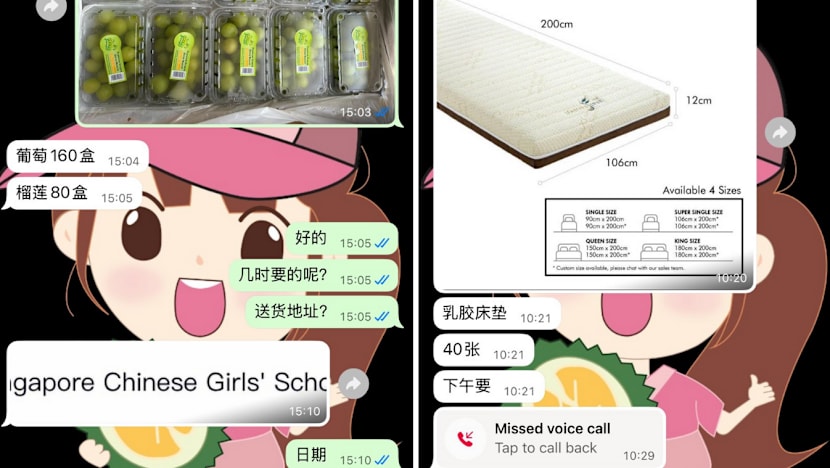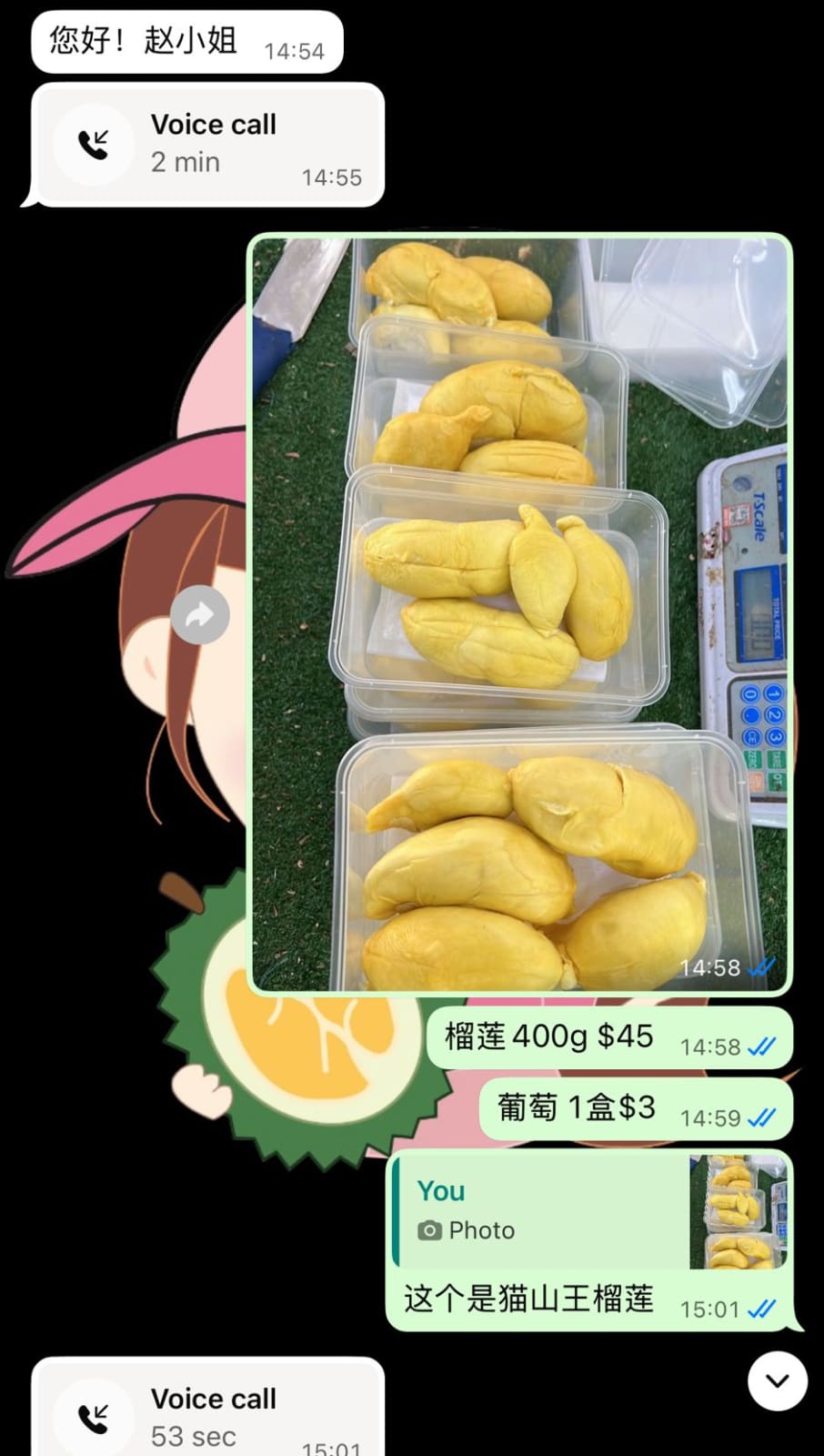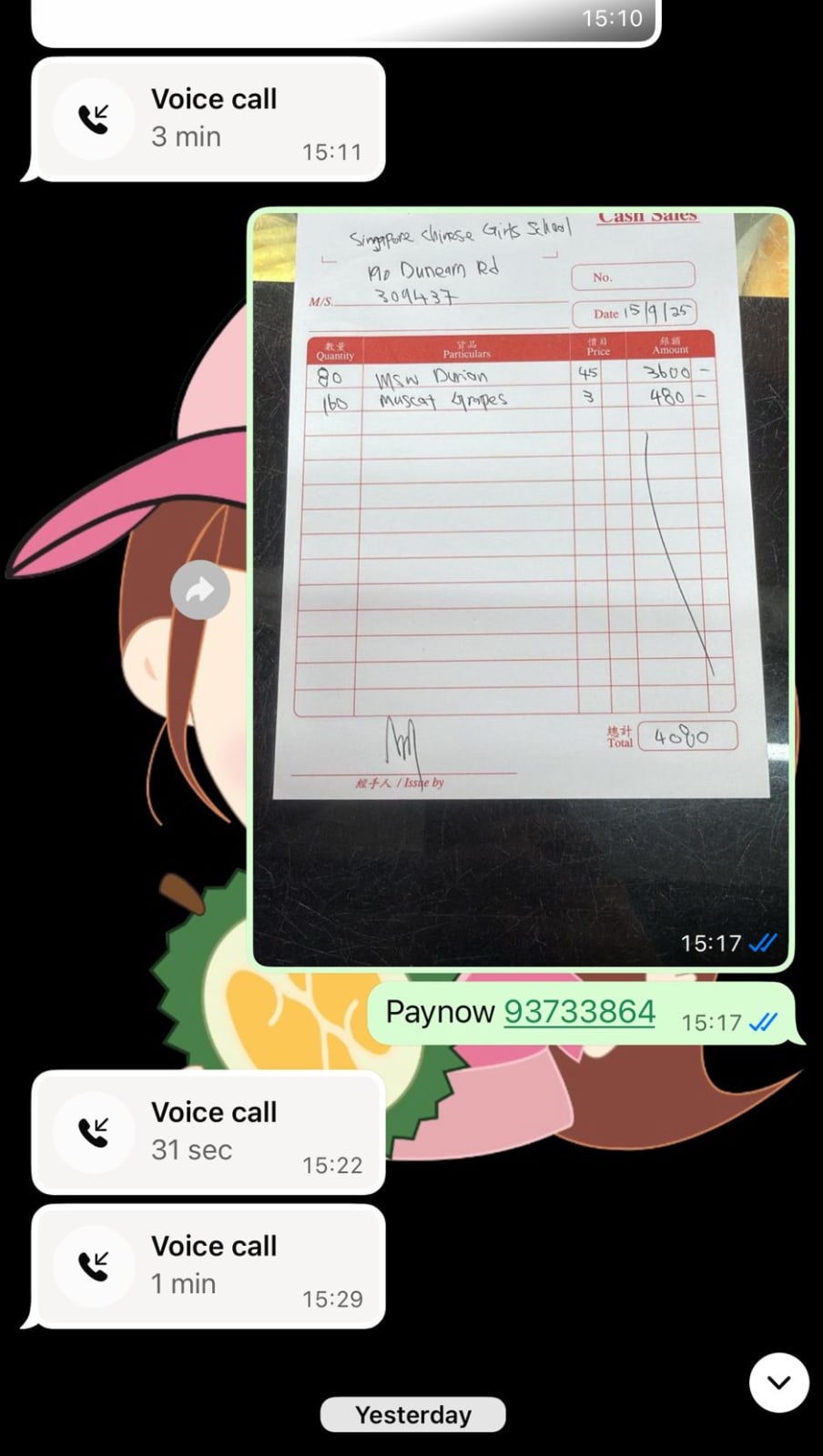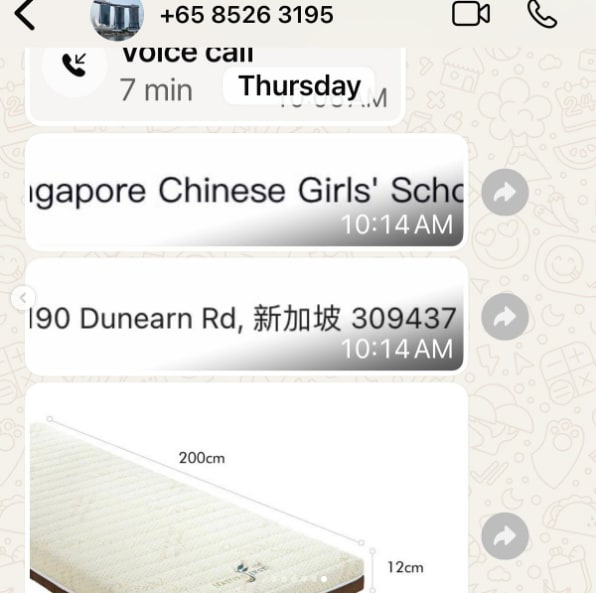More businesses hit by fake bulk orders, with scammer claiming to be school staff
The latest scams targeted local Mediterranean restaurant HaPiHa, fruit and vegetable vendor Nabayla, as well as bedding company Simply Dreams.

A scammer claiming to be from Singapore Chinese Girls' School places an order for grapes and durians from fruit and vegetable vendor Nabayla (left) before following up with an order for 40 mattresses. (Photos: Nabayla/Ping)

This audio is generated by an AI tool.
SINGAPORE: Three more businesses have been targeted in fake bulk order scams, with the latest incidents involving the impersonation of a staff member from Singapore Chinese Girls' School (SCGS).
The latest scams targeted local Mediterranean restaurant HaPiHa, fruit and vegetable vendor Nabayla, as well as bedding company Simply Dreams.
In all three cases, the scammer claimed to be an SCGS staff member and placed large orders.
In response to �鶹��ý's query, SCGS principal Mrs Linda Chan said the school is aware of the impersonation scams involving people falsely claiming to be making purchases on behalf of the school.
It has made a police report.
Several Singapore businesses were recently hit by a string of fake bulk orders involving scammers who claimed to be Singapore Armed Forces (SAF) personnel.
Police said on Tuesday (Sep 16) that three people, aged between 16 and 31, have been arrested for their suspected involvement in those scams.
The owner of Nabayla, who identified herself as Ping, told �鶹��ý on Wednesday that she received an order from the scammer on Monday. The order comprised 180 boxes of grapes and 80 boxes of durians, worth S$4,080 (US$3,200).

When asked for a delivery address, the scammer, who communicated in Chinese, gave a screenshot of the address for SCGS.
Ping said that while such orders are not unusual - having handled corporate events for schools before - they are usually placed a month in advance, with customers requesting a quotation first.
Suspicions were also raised when the male scammer “aggressively” called her several times to insist that his order was urgent. According to Ping, communication with her customers is primarily via email or WhatsApp.
On Tuesday, the scammer called again to order 40 mattresses, claiming they were to be donated to an old folks’ home.
Ping turned down his request as she is not in that line of work. As she had yet to prepare the scammer’s order, she avoided losing money in the incident.

MATTRESS ORDER
A scammer following a similar modus operandi targeted a local restaurant in another incident.
HaPiHa, which specialises in Mediterranean cuisine, wrote on Instagram that it received a call on Sep 11 from someone claiming to be from SCGS, booking a three-day event for 30 people at S$70 to S$100 per person.
The restaurant started preparations after the caller confirmed its S$70 menu. However, on the following day, the same caller asked to buy a mattress for their “event”, promising to transfer the money later.
“Thankfully, our colleagues had warned us about similar scams, so we refused. After that, the caller vanished,” HaPiHa posted on its social media page on Monday.
“We didn’t lose money, but hours of work were wasted”.
The number HaPiHa gave as the scammer’s was different from the number that was used to contact Ping.
Mr Russell Koh, owner of bedding company Simply Dreams, told �鶹��ý that he received a call at 4pm on Sep 16.
The caller asked for 30 bedding sets to be delivered on Sep 18, and said they were to be given as gifts for teachers.
He sent product photos via WhatsApp and a screenshot of the school's name and address.
After Mr Koh gave the man a quote, he called back and said the payment had been approved.
Mr Koh said the man refused to provide an email address and insisted that all communication be done via WhatsApp. He also never requested an invoice or purchase order.
"Based on my prior work experience with schools and government bodies, I know that purchases of this size typically go through (request for quotation) or tender processes, and rarely involve immediate upfront payment without proper documentation," he added.
He saw a report about HaPiHa and got in touch with the restaurant. They compared the WhatsApp chats and realised the scammer went by the same name.
"We did our part to ensure that we are not taken for a ride. It’s important that businesses are aware (of) scam trends too," he said, adding that no loss was incurred as it did not prepare the order.

SCAM SYNDICATE MEMBERS ARRESTED
The latest cases came after a bakery, a florist and a hawker stall were hit last week by fake bulk order scams involving people claiming to be SAF personnel.
Police said on Tuesday that at least five such cases were reported since Sep 4, with total losses amounting to at least S$32,000.
The three people police arrested had allegedly acted on the instructions of a scam syndicate, said the Singapore Police Force.
In July, police warned of fake bulk order scams targeting the renovation, F&B, retail and service industries.
The scammers would pose as teachers or staff from academic institutions in Singapore.
They would contact renovation firms, restaurants, retailers or service-related businesses via phone call or WhatsApp message, pretending to be customers making bulk orders or reservations.
The scammers would later request additional items, specific brands of items that the targeted businesses do not carry, or order quantities that the businesses are unable to fulfil on short notice.
They would then recommend another scammer impersonating as a “supplier” to the victims.
The “customer” may provide fake payment documentation, such as screenshots, to convince the victims that they had made a partial payment for the bulk order in advance.
This tactic is used to persuade the victims to provide payment for the orders placed with the “supplier”.
Victims would only realise they have been scammed when they did not receive any payment from the “customer”, when the “supplier” fails to deliver the goods, or when both the “customer” and the “supplier” become uncontactable.









